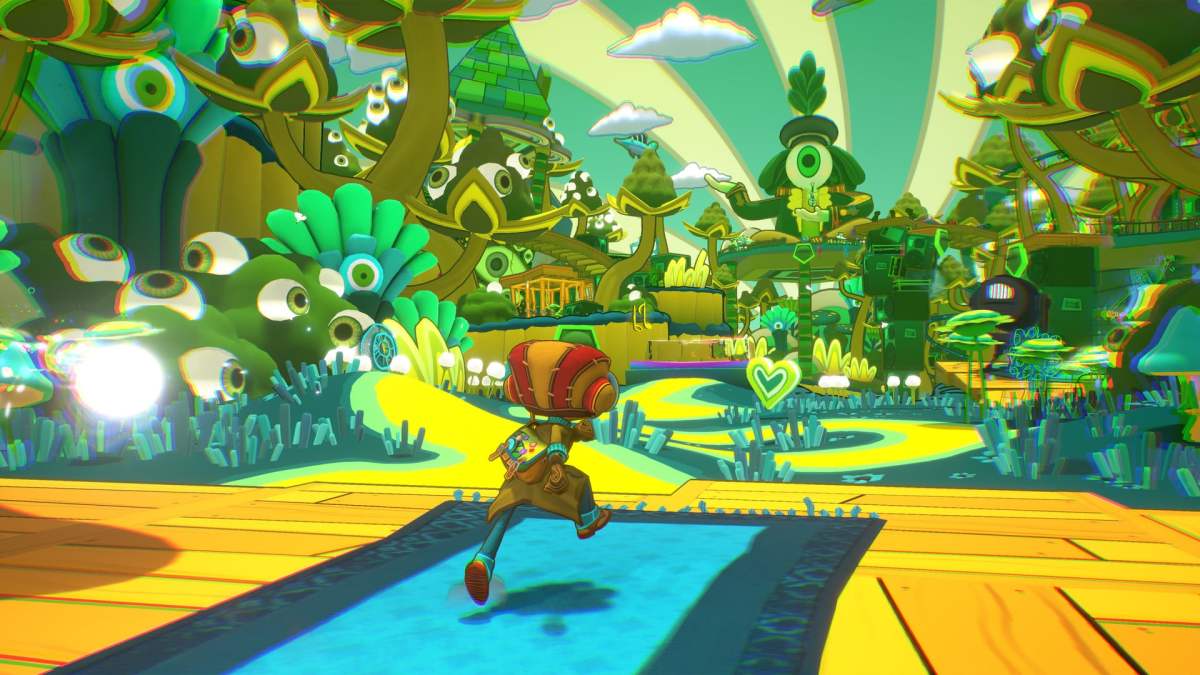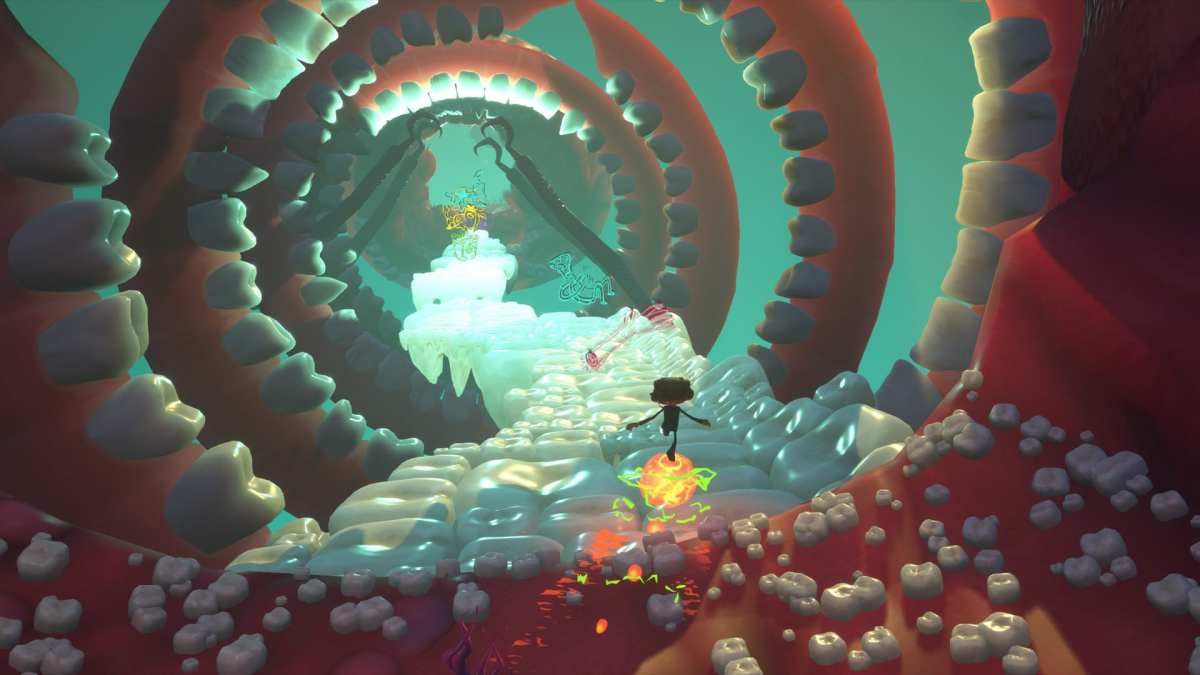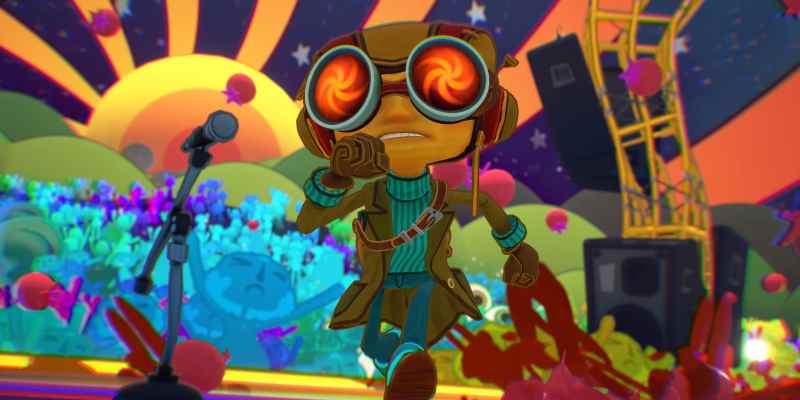A lot might have changed since 2005, but against all odds, Psychonauts has stayed largely the same. Sure, there is a new lick of paint – the Tim Burton-esque art is now buttressed by a remarkable lighting engine and some incredible animation. But at its heart, Psychonauts 2 is the warm, endearing, consistently wacky platformer one would expect from an almost direct sequel to the original. The short narrative gap between Psychonauts and Psychonauts 2 is covered by 2017’s VR exclusive Rhombus of Ruin, but it takes no time at all to catch up. To quote series protagonist Razputin “Raz” Aquato and his knowing fourth-wall-leaning pause, “I haven’t been here in… days.”
It’s a surprisingly effective setup. For those who played Psychonauts at the time of release, the sequel delivers nostalgia that hits that much harder given the wait and the jump back into the old story. It’s hard to look through Psychonauts forums and not feel at least something of what the fans are feeling – some of them taken back to memories of playing on the couch with their parents, many now parents themselves.
For those who have never played Psychonauts or played it many years later, Psychonauts 2 still offers a slice of wholesome platforming that feels perfectly timed, despite everything. In a year of delays and remasters, 18 months into a pandemic that may or may not be ending, it feels like more than serendipity to receive a sequel this long in the making, with this much heart, and with its themes of mental healing, belonging, and helping each other.

The premise of Psychonauts 2 is high-concept enough to summarize in a sentence: You play as Raz, a psychic protégé freshly inducted into the psychonauts, a kind of Men in Black-meets-Inception group as imagined by Pixar, who specialize in psychic espionage and healing. A psychonaut is able to enter the mind of another, which turns out to be the perfect excuse for some of the most inspired art, level design, and game modes this side of Nintendo.
Medically themed roulettes and pachinko machines, a Takeshi’s Castle-style cooking show, and a literal vault of innermost thoughts are just some of the mental locations Raz visits amongst the more prosaic physical spaces. Inside, he collects figments of imagination, nuggets of wisdom, and half-a-minds. He tries to sort our emotional baggage, literal bags that need to be paired up with their tags. He rewires connections between different concepts to create new associations and motivations. He fights bad thoughts, like the tiny bespectacled bureaucrat censors that drone “no” and try to rubber-stamp him out of existence.
The story acknowledges that there is something invasive and perhaps voyeuristic about this process – something that ought to be treated with great care and responsibility. But it nonetheless feels strangely empowering to shoot down winged regrets before they have a chance to weigh you down or to set fire to doubts before they hold you back. “If only it were so easy,” I lament as I connect the thought “socks with pants” with the feeling of delight, or I release emotional baggage by finding its tag. It’s a kind of thought laundry, in the best possible interpretation of that metaphor.

Even if the environments and game modes are big on imagination, the gameplay itself rarely strays beyond the realms of traditional platformer combat and traversal. The clairvoyance power is back, for instance, but while it lets Raz see how other characters see him – from a tiny mackintosh-wearing spy to a vending machine – the power can’t compete with something like Double Fine’s Stacking for sheer inventiveness. I also gripe at a few missed landings due to the occasional odd camera angle, at a couple of missions that go on a little too long, and at maybe a few too many obligatory “collect so many things scattered around the level” challenges.
Nonetheless, Psychonauts 2 feels special: It’s the confluence of story, characters, art, and Peter McConnell’s fantastic soundtrack – a mix of predominantly orchestral and jazz pieces that anyone who played early LucasArts games should instantly feel at home with. But it’s also the timing of the release.
There is something cathartic, or perhaps simply pleasantly escapist, in the idea that I can resolve the mess in my head with the sweep of a hand. Even if Psychonauts 2 looks like a psychedelic fever dream, after 18 months of being intermittently locked indoors, festering in bad thoughts, accumulating emotional baggage, and losing track of any nuggets of wisdom I might have had, it is also a power fantasy that feels especially relevant.
